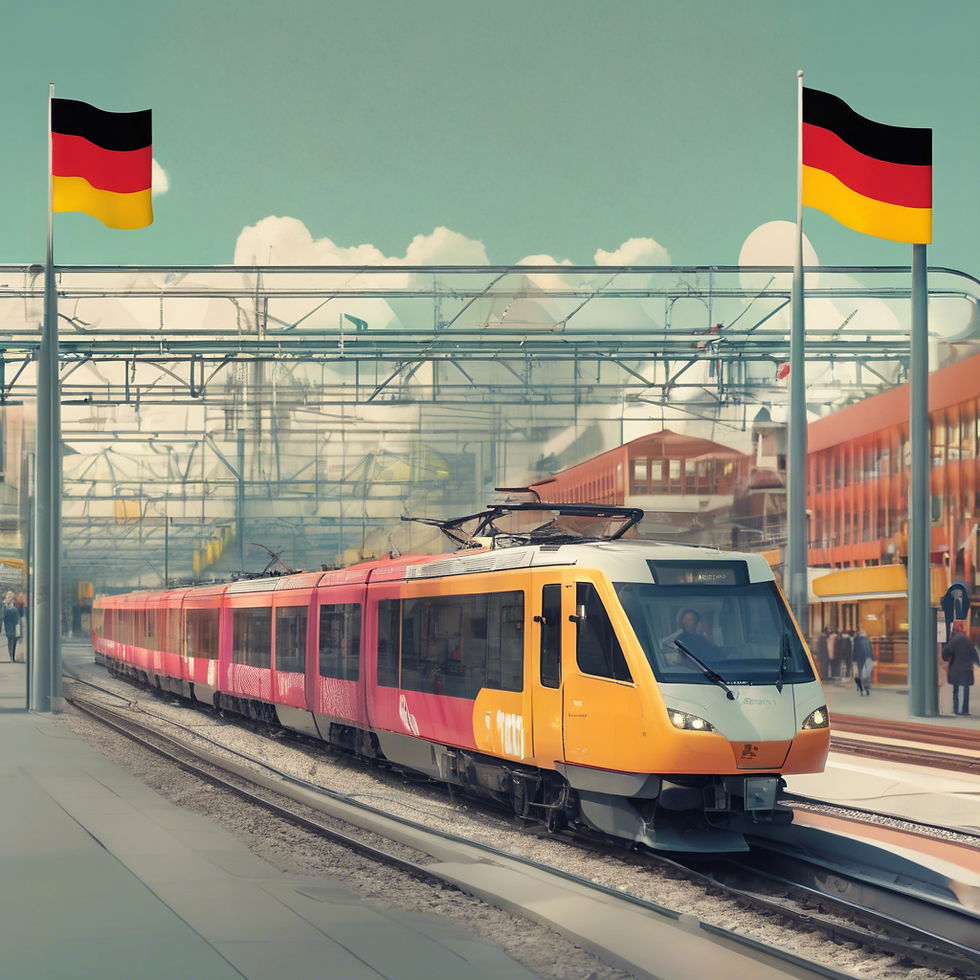Navigating Germany’s Transport Network with Ease
- Sanjeev Rawat
- May 6, 2025
- 4 min read
Updated: May 7, 2025

Ah, you've arrived in Germany, the land of cutting-edge engineering, fairytale castles, and… trains that operate with precision? Indeed, Germany’s acclaim for its punctuality is far from mere folklore. Whether you’re hurrying to your lectures, indulging in Berlin’s bustling nightlife, or taking weekend trips to the stunning Alps, mastering the transport system is your ticket to fully embracing student life here. Let’s delve into all the essentials you need to grasp regarding trains, trams, tickets, and savvy travel tips.
Why Germany’s Public Transport is Your New Best Friend
Forget congested metros or auto-rickshaws; Germany's public transportation is a well-oiled system. You might set your watch by the precision of the timetables that connect the cities with a network of trains, trams, buses, and subways (U-Bahn), urban rail (S-Bahn), and regional trains (Regionalbahn). Most of all? Students receive significant discounts, which allows them to travel quickly across cities or perhaps the nation. A word of advice: if you want to prevent stinkeblicke (filthy stares), observe the laws of the German transport system. This includes things like not playing loud music and always validating your tickets.
A Beginner's Guide to the U-Bahn, S-Bahn, and Regional Train System
Let us decode the acronyms:
U-Bahn: Berlin, Munich, and Hamburg are all connected via the U-Bahn (Untergrundbahn), a type of underground rail system. It's the best option for short journeys within the city.
S-Bahn: The S-Bahn, also known as the Stadttschnellbahn, links urban cores to outlying areas and neighboring towns. Ideal for day trips to lakes or for getting to nearby universities.
Regional Trains (RE, RB): Connecting smaller towns and rural areas, regional trains (RE, RB) run between them. Do you need to go to Heidelberg to see a friend who lives in Frankfurt? Feel free to hop on.
Trams and Buses: Transportation via bus or tram: bridge the gaps where trains cannot reach. Short journeys or rides at night, when trains don't run, are perfect for this.
Student Travel Passes: Your Wallet’s Best Friend
You will spend your life as a student by these two words: Semesterticket . College students pay between €150 and €300 every semester for a golden pass that allows them unlimited rides on local trains, buses, trams, and the U-Bahn and S-Bahn inside their home state. To illustrate:
Berlin: Includes Potsdam and zones ABC (the city and its suburbs) .
Munich: Available on the whole MVV system.
North Rhine-Westphalia: A fantastic offer: visit Cologne, Düsseldorf, and Bonn without paying a dime!
The Deutsche Bahn (DB) is the train to book for trips between cities. For students under the age of 27, BahnCard offers two different discounts: 25% off all tickets and 50% off, although at a higher price. The DB Navigator app allows users to purchase cheap tickets in advance. For example, you can go from Berlin to Frankfurt for €19. Of course!
The Deutschland-Ticket: Unlimited Travel for €49/Month
The Deutschland-Ticket (D-Ticket), which was introduced in 2023, is a game changer. For just €49 per month, you get unlimited trips on all local and regional transport (U-Bahn, buses, and RE trains) in Germany. Yes, throughout the country (except long-distance IC/ICE trains). It's ideal for students planning weekend getaways; imagine touring the Black Forest, Cologne Cathedral, and Leipzig's museums without having to pay for tickets
Methods for Purchasing:
- You can enroll through your school, the DB Navigator app, or a local transportation app (like Berlin's BVG).
-No commitments required cancel at any time
Cycling in Germany: Pedal Power for Students on a Budget
The Germans are almost as fond of bicycles as beer gardens. In addition to bike lanes and traffic signals, several cities now offer inexpensive bike rental services, such as Nextbike, which costs €1.50 for 30 minutes. Check out eBay Kleinanzeigen (Germany's Craigslist) or college bulletin boards; many students buy used bikes for €50-€150. Keep in mind:
Bike theft does occur, therefore always lock your bike.
Please do not ride on sidewalks or other prohibited areas.
Keep your lights on at night; violators will face a fine of €20.
Taxis, Ride-Sharing, and Car Rentals: When to Treat Yourself
Public transportation will meet 99% of your needs, although there are alternatives for late-night returns or group outings. Take advantage of apps like FREE NOW to reserve a taxi, which is a safe but expensive option (€2-€3 per kilometer). Using BlaBlaCar, you may share rides with locals for longer excursions (€25 from Munich to Hamburg, for example). Want a ride for the weekend? Companies like Sixt and Europcar provide student discounts, making them ideal for road trips along the Romantic Road or riding the Autobahn (speed limits are optional).
Pro Tips to Avoid Fines and Fumbles
Before boarding, make sure your paper ticket is validated at the yellow machines on the platform. Forgetting will result in a €60 fine, no justifications allowed. Download the DB Navigator for real-time train updates, as well as local apps such as BVG (Berlin) and MVV (Munich) for bus/tram schedules. Check the schedule to prevent getting stuck; after midnight, the U-Bahn lines are replaced by night buses (Nachtbus). Misplaced an item? Before you freak out, check with the Fundbüro (lost property office). Germans are known to be very honest.
The Last Stop: Making the Most of German Transportation
Being able to travel freely is at the heart of Germany's public transportation system. With a Semesterticket or Deutschland-Ticket, you may balance lectures, internships, and alpine walks while staying within your budget. Plus, adopting the punctual, environmentally careful commute culture gains you a lot of respect from locals. Get your ticket, get on the U-Bahn, and remember that every wrong turn could lead you to a secret beer garden or a street musician playing music for you.



